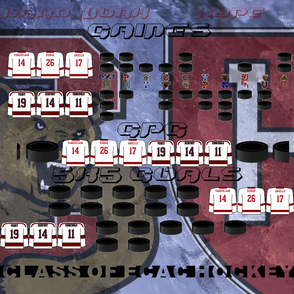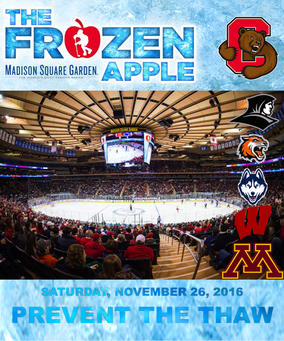You are what your record says you are.
Exams were taken. Holidays were observed on either side of those meters. Food was devoured. Trips were undertaken.
The Big Red wrapped first-semester play with an exquisite, seasonally appropriate ribbon typified with John Knisley's goal and Anthony Angello's buzzer beater. Knisley returned from abdominal injury and surgery in little over a month's time to ensure that the draft of the first semester materialized. One may say that he guaranteed it. His character in doing so was of the team.
Each week during the first semester, a new player would step up to carry the mantle of leader. Moments took lives of their own. Christian Hilbrich's goal at Dwyer Arena, Jeff Kubiak's last-seconds goal against Princeton, Anthony Angello's overtime winner against Colgate, and Dan Wedman's grappling on after a game-saving blocked shot at Madison Square Garden. These moments were common. They were not unusual. The uncommonly selfless became common. That was last season.
The tautology of Bill Parcells atop this page, one that Coach Schafer invokes occasionally, is true. Like all great quotes of prediction, it is absolutely true. Until it is not.
Readers may not expect this but this contributor finds in the Red's gaudy record as much of a cause for alarm as praise. A record of such a quality often leads to a macro-problem on the scale of the micro-problem that doomed Cornell against Quinnipiac. A one-loss record through the first one-third of the regular-season schedule resembles a sizable three-goal lead over halfway through a game against a quality opponent. Mercy is a vice, not a virtue, that metastasizes into hubris.
Opponents have no reason to revere a Cornell team, no matter its record, that has hibernated for more than three weeks. The first semester was last season. Everything needs to be proven anew. Think this is overstated?
This writer turns to the example of football once more. The College Football Playoff inaugurated last year. The layoff and extensive travel between conference title games, usually played conveniently for comparative reasons during the first weekend in December, and the semifinals and finals, played respectively and conveniently within days of New Year's Eve and the second week in January, were culprits in the erosion of the honed play of teams earning berths. Urban Meyer, Mark Helfrich, and Nick Saban identified exhausting travel and downtime as overly daunting on student-athletes in a manner that sacrificed their on-field performance.
The players for this Cornell hockey team are coming off a more than three-week break. They endured among the most rigorous examination processes, traveled home for a portion of break, headed to Florida, and planned returns to Upstate New York after a stint in the Sunshine State. If the itinerary for teams in the College Football Playoff was too daunting for those student-athletes, the surpassingly more challenging slog for the wearer of the carnelian served to reset the season.
Will they be as good as their record? Will they be better? Will they be worse? It is as of yet undetermined.
I shall be telling this with a sigh
Somewhere ages and ages hence:
Two roads diverged in a wood, and I,
I took the one less traveled by,
And that has made all the difference.
The junction between the first semester when teams find their identities and the second semester when teams write their legacies is a divergence in the woods. Cornell hockey was left to wander the wilderness for three weeks. Its players reset. Resetting is not to be viewed as bad.
Coach Schafer indicated that the three-week break would allow the health of his forward corps to become flush. The Red bench boss indicated that all skaters but Luc Lalor were expected to be available to the coaching staff for intersession and the beginning of second-semester play.
These wanderings were not lost. They were guided by a vox clamantis in deserto. The calamity was the well-known bark of Coach Schafer. It reminded his players that when their thoughts turned to the season, they must think in one particular way.
"We want to have the mentality of a 1-8-2 team...we start over," told the admonition of the champion coach.
This is an entirely new season. The first semester, last season, was not as other believed it in retrospect. Niagara, a team that took six weeks to get its first win, nearly derailed the first win that Cornell enjoyed during the first semester. A healthy dose of humility is the essence of that. Cornell can be again a team that deserves the praise that one-time naysayers capriciously have decided to pour onto the team. It easily could be a team that did not find a way to win at Dwyer Arena.
One team element for the Red needs a gross reset. Cornell closed first-semester play with a power-play unit that allowed too many unforced clears and, when playing like it was drilled in its systems, too predictably choreographed its puck movements so that more skilled penalty-killing units never felt threatened. For East Hill's hockey team to remain threatening and claim any semblance of the dominance that commentators have attributed to it, Cornell needs to be more honed on the power play and that needs to start in Florida against a Providence team that gives little and takes much.
This is not to undermine offensive confidence. One weekend, one weekend, during the first semester gave any reason for anyone to doubt the offensive prowess of this carnelian-and-white team. Cornell scored one goal on its swing through Connecticut and Rhode Island. Mitch Gillam, proving that his architectural niche is minimalism, built a three-point weekend around a mere one goal. How did the Big Red respond? Its skaters averaged 3.33 goals per game to close out the semester.
This team can score. It can score from the youngest to the oldest. Every senior has tallied a goal even if they had to come back from surgery just to do it (looking at you, Knisley). Four of five freshmen who have played more than two games own at least a goal in their column. Offense may come in ebbs and flows, but this team's dam is filled to the brim.
Providence is the first test of the new season. Like the first semester, the Red nominally begin on the road. Hey, if LeBron came say Miami and Cleveland are the same, Red skaters and the Lynah Faithful can believe that there is no difference between Western New York and western Florida. Nate Leaman's squad is as confident in all phases of the game as Cornell deserves to be on offense.
Leaman, having a bit of the latent Harkness influence remain with him from his days at Union College, converted Jake Walman from a forward to a defenseman. Walman since has played like he thinks that he is Dan Lodboa or something. Walman leads all blue liners in goals per game. The sophomore defenseman is behind one-tenth of a goal per game off of the pace of Jimmy Vesey of Harvard. The high-scoring Friar is unlikely to compete in this game against the Red.
Providence College, like Union College before it, has become a clearing house where Nate Leaman stockpiles astounding amounts of goaltending talent. Leaman started with Jon Gillies. Gillies handed him the national championship trophy last season before ending his collegiate career. Then, Leaman picked up Hayden Hawkey, a highly touted goaltender from the USHL. Why? Probably because he could. The crazy part? Hawkey has not been the assumed starter this season.
Nick Ellis likely will be the first last obstacle that challenges the Red's offensive onslaught in Florida. Ellis owns a 0.940 save percentage. The resolve of Cornell will be tested on the other side of the bracket as well. Thatcher Demko leads the nation with six shutouts after recovering from offseason surgery and an injury. Statistics may not say much of Ohio State's Christian Frey this season. Frey is prone to big games. He held one of the nation's best offenses to one goal and ended Penn State's season in so doing last season in the Big Ten tournament.
Oh, yeah, Jerry York's stable of forwards? They're pretty good. The Eagles lack the services of raved-about sensation Colin White. White is very talented. However, for a dose of perspective, he has scored two more goals than Anthony Angello on five more games. Fear not, Jerry York has you covered if you want to see more gaudy freshman talent. Miles Wood may still fly with the Eagles. An undefeated opponent, an always talented team, and a team too easily overlooked make a deadly mix.
What type of sigh will accompany our telling of this season? Will it be of exasperation or elation?
Will this team be as good its first-semester record? One thing is certain, if its members want any chance of being that good, especially with the steep competition it will face in the coming weeks, they better not think so. A new season begins.





 RSS Feed
RSS Feed
